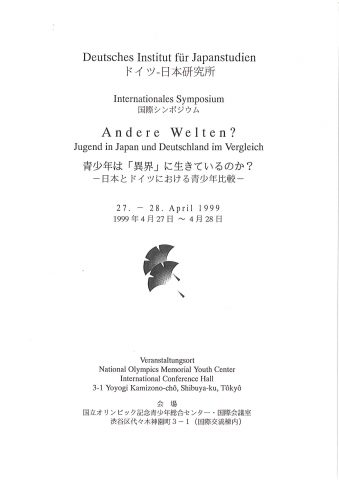
Download
Venue
National Olympics Memorial Youth Center, International Conference Hall
3-1 Yoyogi Kamizono-cho, Shibuya-ku, Tokyo 151-0052
Access
Co-organizer
Friedrich-Ebert-Foundation (FES)
Andere Welten? Jugend in Japan und Deutschland im Vergleich (Another world? Comparing youth in Japan and Germany)
April 27 - April 28, 1999
The DIJ is conducting an international youth symposium in cooperation with the Friedrich-Ebert Foundation. The aim of this symposium is to analyze how the real situation of youth is reflected in German and Japanese Youth Studies. The topic, quote;different worldsquote; refers to the different dimensions inherent in this comparison. For one, this is the difference between Germany and Japan. Secondly, there are the specific ways of thinking and living of younger generations in contrast to those of parents and teachers. A third difference to be analyzed and evaluated is the one between the female and the male worlds. Such focus on difference, however, also includes a search for similarities, not only in the actual life experience but also in the Youth Studies approach.
What developments can we see in the course of the last 20 years? The bursting of Japan’s bubble economy in 1990-91 has caused fundamental economic and social restructuring, deeply affecting the lives of young people. They face difficulties in the job market, as well as increasing insecurities in their search for identity. Institutions dealing with young people are forced to respond to this new situation. German youth research faces similar challenges, especially since the 1970s, in trying to track the effects of social developments on the lives and thoughts of young people.
Topics for analysis and comparison are changing gender roles, youth problems, and issues of everyday life and identity. Specific examples for each topic are meant to provide the basis for comparison and contrast not only between the two countries, but also between different perspectives. This symposium is meant as an opportunity to strengthen the communication between German, Japanese and American youth experts, whose different perspectives on similar problems can create a new understanding for the situation of young people, as well as develop new strategies for preventative measures and problem-solving.
Presentations
Day 1 April 27th (Tuesday)
9:30
Opening
9:45
Keynote Speech
Atsushi Kadowaki, University Tsukuba
10:45
Panel 1: International Comparative Youth Studies
Susanne Kreitz-Sandberg
Chisaki Toyama-Bialke, Tokyo University
14:00
Panel 2: Young Women’s Transition from School to Work
Helga Krüger, Bremen University
Yuko Nakanishi, Musashi University
16:15
Panel 3: Young Men’s Identity Questions
Futoshi Taga, Kurume University
Makoto Kobayashi, Keio University/DAAD
Day 2 April 28th (Wednesday)
9:15
Introductory Presentation
Wilhelm Heitmeyer, University Bielefeld
10:15
Panel 4: Violence as Social Problem
Hideo Tokuoka, University of Kyoto
Gesine Foljanty-Jost, University of Halle
13:30
Panel 5: Youth Unemployment
Reiko Kosugi, The Japan Institute of Labor
Monika Sommer, German Embassy, Tokyo